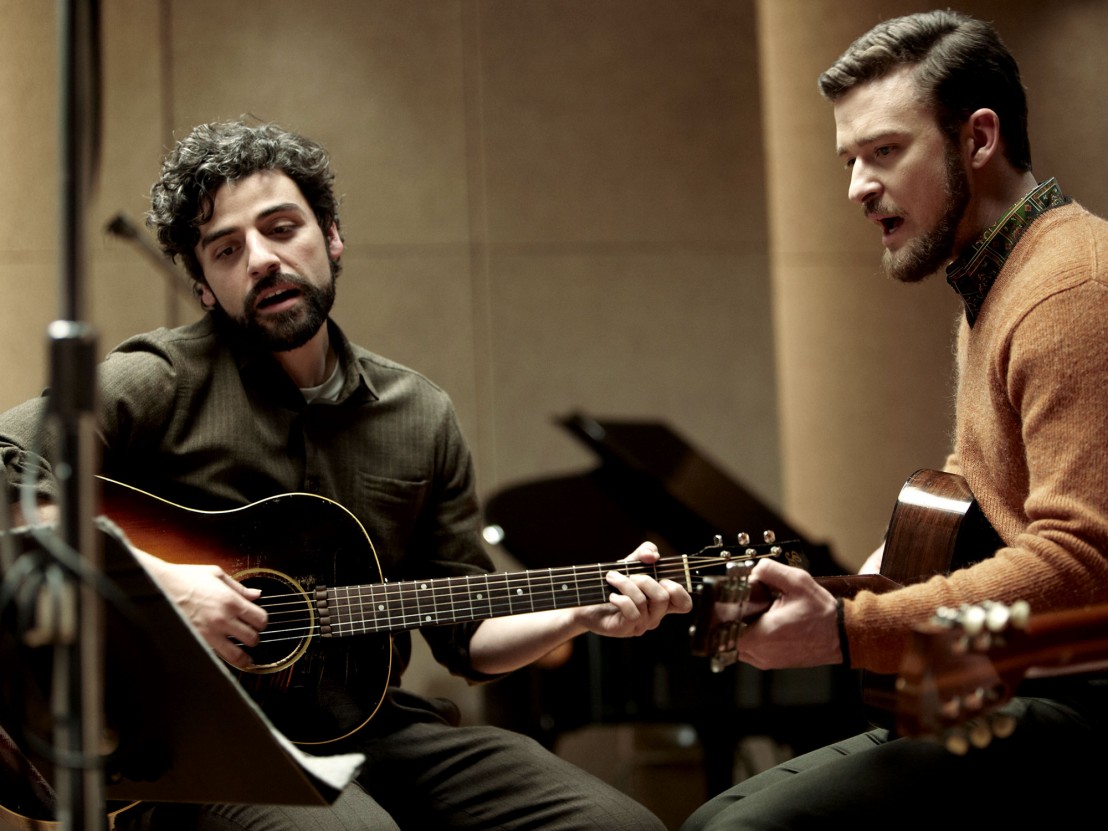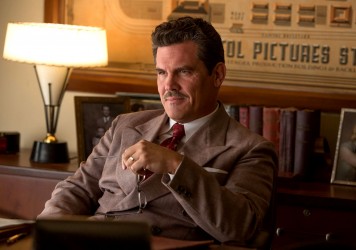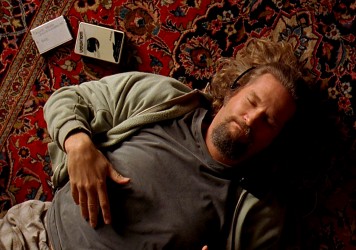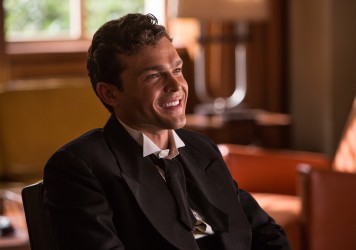
With able assistance from the likes of regular composer Carter Burwell and the eclectic stewardship of production luminary “T Bone” Burnet, the cinema of the Coen brothers stands as a testament to the sublime partnership of music and film. It’s for that very reason we’ve decided to pluck and parse 10 platters that really mattered from the directors’ unique and constantly astounding oeuvre.
Appropriately enough, an actual jukebox is showcased in the Coen brothers’ debut film, Blood Simple, though in a somewhat more flamboyant a manner than what we’ve now come to expect from the duo’s more overtly dramatic features. In an unexpectedly heightened flourish, we shadow a bartender as he strolls across a pub’s dank floor, watch him insert a coin and select ‘It’s the Same Old Song’ by soul quartet the Four Tops, then follow back along at his feet as he delivers some suave dialogue to a female patron. It’s a noticeably stylised moment, similar in spirit to what Quentin Tarantino would go on to perfect in the ’90s, but in an otherwise dark and moody noir it stands out as the Coen’s first successful attempt at pillaging the pop canon.
The Coens have made it a signature of their period pieces to feature era-appropriate tunes alongside Carter Burwell’s traditional scores. Miller’s Crossing was their first recreation of a bygone epoch and thus their first opportunity to employ pre-modern music in their unique cinematic universe. They’re also masters of the incongruous gesture, often implementing contradictions in audio/visual presentation. These two techniques dovetail to thrilling effect in one of the film’s early sequences as a shoot-out spills from the bedroom of a mafioso into a suburban street as Frank Patterson’s rendition of ‘Danny Boy’ spins soulfully, ominously on the home hi-fi. The result is one of the most memorable set pieces in the entire Coen catalogue.
Befitting their liberal approach to genre, many of the Coens’ most indelible musical moments are likewise adventurous in spirit. This accounts for their extensive use of covers and reinterpretations of American standards, but sometimes you’ve got to have a laugh at the expense of novelty culture, and the brief cameo by Puerto Rican lounge act José Feliciano in Fargo is one of the slyest, funniest bits the Coens ever dreamt up. As Steve Buscemi’s Carl Showalter entertains a hooker over dinner, Feliciano himself can be seen and heard in the background performing ‘Let’s Find Each Other Tonight’, the title no doubt a wink at both the scene’s developing transaction as well as at more perceptive viewers fully aware of the singer’s regrettably earnest tendencies.
Perhaps no song is as associated with a Coen brothers character as ‘Just Dropped In (To See What Condition My Condition Was In)’ by Kenny Rogers and the First Edition. It certainly helps that this 1968 psychedelic classic is allowed to play out to near completion – a rarity for any film – but as the theme to the imagined adult film debut of the Coens’ ultimate creation, the Dude (Jeff Bridges), it has built in comedic capacity and even thematic correlation. Except Gutterballs is no ordinary bongo flick, in the mind of the Dude instead becoming a hallucinatory barrage of bowling and Roman iconography starring Adolf Hitler and Julianne Moore. Who did you think would provide the soundtrack? The fucking Eagles?
Another song the Coens allow to play in its entirety, ‘I’ll Fly Away’ by Alison Kruass and Gillian Welch, like “Just Dropped In” before it, provides musical accompaniment to a montage. The song’s theme of escape resounds in the plight of a trio of escaped convicts (played by George Clooney, John Turturro, and Tim Blake Nelson) whom O Brother, Where Art Thou? follows across the Mississippi Delta and which the Coens exploit for musical and comedic pleasures alike. The universal resonance of not only “I’ll Fly Away” but all the film’s attendant folk music helped the O Brother soundtrack became one of the biggest sellers of the modern era, proving the market for old sounds is as healthy as ever.
Elvis Presley’s last number-one single, ‘Suspicious Minds’, opens the Coen brothers’ 2003 film Intolerable Cruelty, setting a darkly humorous tone for this screwball tale of infidelity and legal comeuppance. And from there the brothers pit an ensemble of zany characters against one another in an array of blackmail attempts, prenuptial scheming, and elaborate revenge plots. Everyone here, from George Clooney to Catherine Zeta-Jones to Billy Bob Thornton to Richard Jenkins, seems to be channeling unfashionable archetypes, playing up the inherent hilarity of romantic drama. But it’s Elvis’ velvet-voiced pleading, all but echoing in the recesses of each successive ruse, which continues to lace the proceedings with an aura of unassuming transgression, going some way toward grounding this film’s more flighty tendencies.
If the Coens’ remake of The Ladykillers can be said to have a theme song, it is, without question, ‘Trouble of This World’. Appearing in no less than three iterations between the film and soundtrack – which is otherwise comprised of an impressive swathe of gospel and blues music – the song can be easily read as a thematic comment on the criminal exploits of Professor Goldthwaite Higginson Dorr (Tom Hanks) and his ragtag band of misfit murderers. In updating the 1955 Ealing comedy of the same name, the Coens’ attempted to bridge the past and present in a unique, though not always productive, manner. But no matter their handle on the material, the brothers’ musical touch here remained true.
Most of the songs chosen for this feature were selected for their thematic relation to or utilisation within a given narrative. The Fugs’ ‘CIA Man’, however, is just a wildly unique song that, while it happens to tie in with Burn After Reading’s undercover intelligence plot, doesn’t seem to serve much function in the end credits except when heard as a meta cinematic grace note on an already self-referential film. I like to think that the Coens’ knew they wanted to use this track but had little idea how to use it. After all, there aren’t many instances in a movie where a proto-garage rock hoedown would prove appropriate, even in a film as off-the-wall as Burn After Reading.
As you may have noticed, the Coens like to weave the disparate meanings of songs into the fabric of their films. But save for the Dude’s otherwise incidental love of CCR, there isn’t another example of a band becoming a de facto character in one of their films like the Jefferson Airplane in A Serious Man. The psych-pop legends are present throughout the film, not only on the soundtrack but also in the dialogue (“These are the members…of the Airplane!”, Rabbi Marshak proclaims at one unexpected juncture), while the uneasy couplet, “When the truth is found to be lies / And all the joy within you dies,” from their most famous song, ‘Somebody to Love’, takes on grave consequence in the film’s closing moments.
For a duo as musically inclined as the Coens it seems inevitable that they would one day make a film directly about the industry. In that sense, Inside Llewyn Davis feels like the film they’ve been building toward, and the accompanying soundtrack appropriately flourishes within and apart from the narrative. While likely an amalgamation of identities, the dramatic arc of the title character has clear parallels with Greenwich Village folk journeyman Dave Van Ronk, and in a sort of spiritual nod to his perseverance, the Coens’ close out their newest film with Van Ronk’s ‘Green, Green Rocky Road’, a first person account of the artistic tribulations that one hopes will someday provide inspiration for even greater success – as they have here.
Hail, Caesar! is released 4 March.
Published 1 Mar 2016

The Coen brothers return in scintillating and provocative form with this complex satire of 1950s Hollywood.

The acclaimed American composer revisits some of his most iconic original scores for the Hail, Caesar! directors.

The Hail, Caesar! star reveals how the writer/director pair put him at ease on the set of their latest triumph.